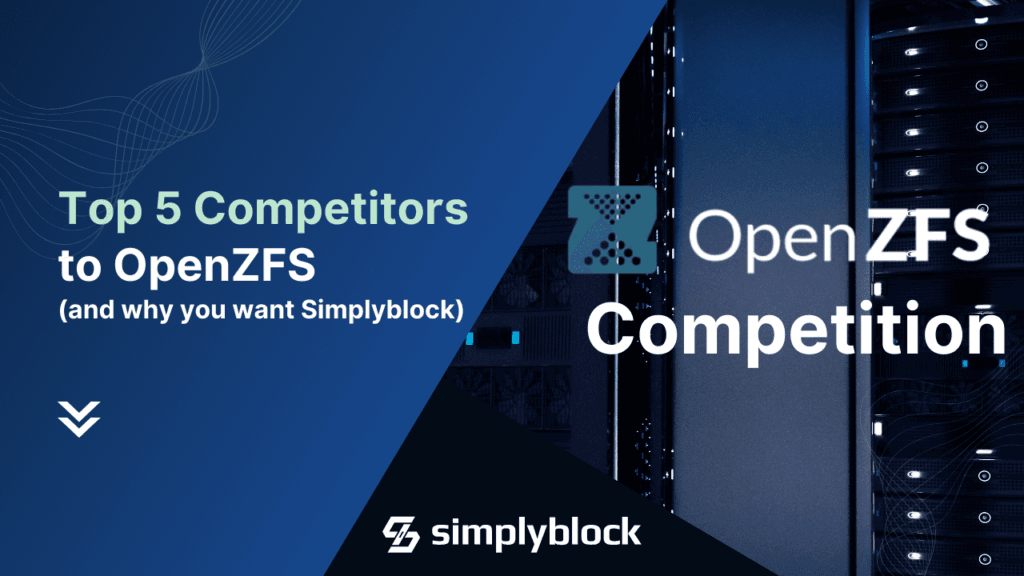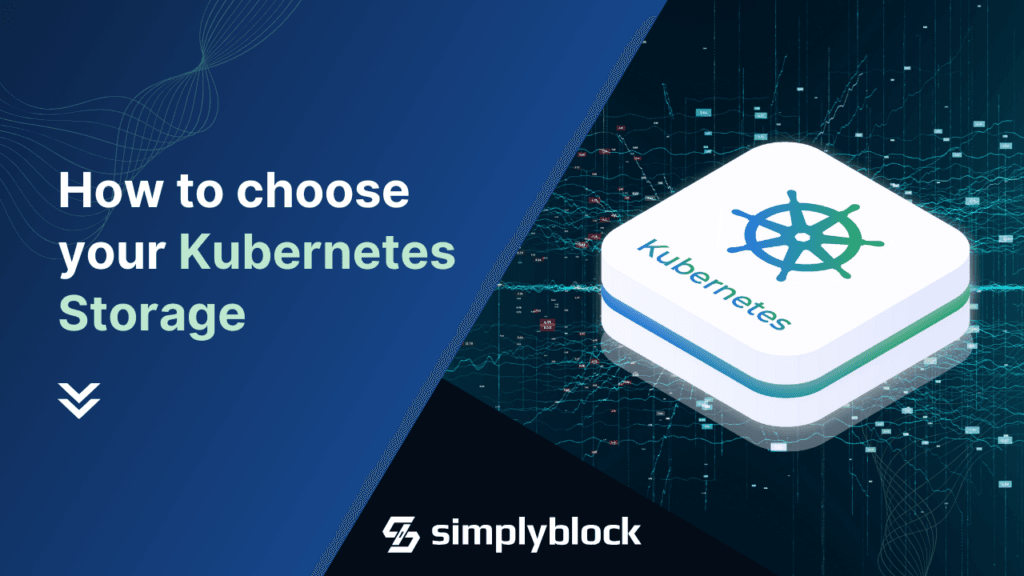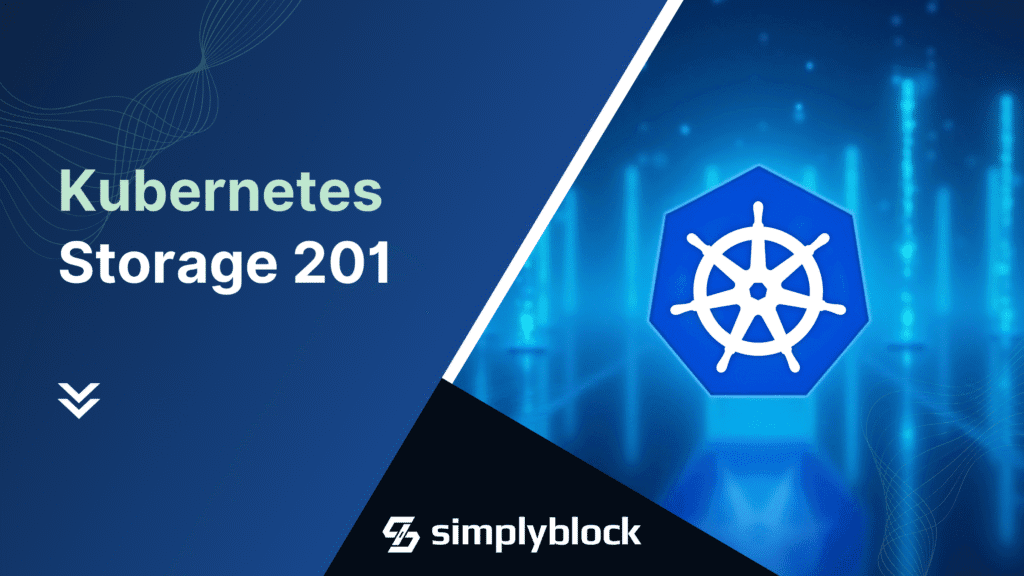
OpenZFS is a robust, open-source file system and volume manager renowned for its data integrity features, including snapshots, copy-on-write, and RAID-Z configurations. Widely adopted in enterprise environments, it offers high storage capacities and efficient data compression. However, as storage demands evolve, several ZFS competitors have emerged, offering enhanced performance, scalability, and advanced features.
How Simplyblock™ Compares to ZFS
Simplyblock is a high-performance, NVMe-first storage platform designed explicitly for modern workloads. It delivers ultra-low latency, high IOPS, and seamless scalability, addressing the limitations often encountered with OpenZFS in large-scale deployments.
Benefits of Simplyblock:
- Superior Performance: Leverages NVMe over Fabrics (NVMe-oF) instead of the legacy iSCSI protocol to achieve sub-millisecond latency and high throughput.
- Scalability: Supports linear scale-out, ensuring consistent performance as your storage needs grow.
- Advanced Features: Offers distributed erasure coding, application-transparent storage tiering, and DPU optimization.
- Flexibility: Compatible with both ARM64 and x64 architectures, providing versatility across environments.
What Sets Simplyblock Apart from ZFS
- Enhanced Performance: Achieves higher IOPS and lower latency, crucial for demanding applications.
- Advanced Data Protection: Utilizes distributed erasure coding for efficient and reliable data storage.
- Comprehensive Protocol Support: Full end-to-end NVMe-oF support ensures optimal performance across the stack.
- Future-Ready Architecture: Designed with modular, adaptive, unified, shared-everything (MAUS) principles for modern workloads.
Well-Known Storage Platforms in the Market
Choosing the right storage solution depends on workload needs, scalability, and operational complexity. Below is a quick overview of several widely adopted platforms, each with a distinct approach to storage.
From open-source systems to enterprise-grade solutions, these tools reflect key options in the current market.
Ceph
Ceph is an open-source software-defined storage platform that provides object, block, and file storage in a unified system. Known for its scalability and fault tolerance, Ceph is suitable for large-scale deployments requiring robust data protection and flexibility.
Portworx
Portworx offers a cloud-native storage solution optimized for Kubernetes, delivering high availability, data security, and backup capabilities. It’s designed for enterprises seeking scalable and reliable storage for containerized applications.
Blockbridge
Blockbridge delivers high-performance block storage solutions with a focus on automation and efficiency. It caters to enterprises requiring predictable performance and streamlined storage management in virtualized environments.
Dell EMC
Dell EMC offers a range of storage solutions, including the PowerMax and Unity XT series, designed for high performance and scalability. These solutions are suitable for enterprises seeking robust and reliable storage infrastructure.
Technical Capabilities Across Popular Storage Solutions
| Feature | simplyblock | OpenZFS | Ceph | Portworx | Blockbridge | Dell EMC |
|---|---|---|---|---|---|---|
| Linear Scale-Out Performance | ✅ | ❌ | ✅ | ✅ | ✅ | ❌ |
| Advanced (Distributed) Erasure Coding | ✅ | ❌ | ❌ | ❌ | ❌ | ❌ |
| High IOPS Density | ✅ | ❌ | ❌ | ❌ | ❌ | ❌ |
| Supports ARM64 and x64 | ✅ | ✅ | ✅ | ❌ | ❌ | ❌ |
| DPU Optimized | ✅ | ❌ | ❌ | ❌ | ❌ | ❌ |
| End-to-End NVMe-oF Support | ✅ | ❌ | ❌ | ❌ | ❌ | ❌ |
| Application-Transparent Storage Tiering | ✅ | ✅ | ❌ | ❌ | ❌ | ❌ |
Why Simplyblock May Be a Stronger Choice Than ZFS
While OpenZFS provides a solid foundation for storage solutions, enterprises with demanding performance and scalability requirements may find it lacking. ZFS competitors like simplyblock offer advanced features, superior performance, and greater flexibility, making them suitable for modern, data-intensive applications.
Questions and Answers
Modern storage technologies such as NVMe over Fabrics (NVMe-oF) offer significant performance advantages over traditional storage protocols used by ZFS. Competitors like simplyblock leverage NVMe-oF to deliver sub-millisecond latency and high IOPS, which is especially beneficial in high-demand environments like cloud-native applications. ZFS, although reliable, does not natively support NVMe technologies, making newer solutions like simplyblock better suited for workloads requiring ultra-fast data access.
Distributed erasure coding is an advanced data protection technique that provides superior reliability and scalability compared to traditional RAID configurations like those in ZFS. While ZFS offers RAID-Z for data protection, competitors such as simplyblock use distributed erasure coding to improve fault tolerance and storage efficiency. This approach allows these storage solutions to handle larger datasets with greater reliability and minimal overhead.
ZFS can struggle to scale efficiently as data needs grow, especially in distributed environments. In contrast, competitors like Simplyblock, Ceph, and Portworx support linear scale-out performance, enabling them to add resources seamlessly without impacting system performance. This is particularly important for modern workloads that demand flexible and scalable storage solutions, where Simplyblock excels with its architecture built for horizontal scalability.
While ZFS can be configured for Kubernetes environments, it lacks native cloud-native storage features and integration. Kubernetes-native solutions such as Portworx and Ceph are optimized for containerized workloads, offering automated scaling and high availability. Simplyblock also provides Kubernetes integration, offering high-performance storage with low-latency access, making it a strong competitor to ZFS and better suited for modern containerized applications.
Unlike ZFS, which is primarily designed for x64 architectures, Simplyblock supports both ARM64 and x64 architectures, offering greater flexibility in diverse hardware environments. This makes simplyblock a versatile competitor to ZFS, allowing businesses to deploy storage solutions across different platforms, from on-premises servers to cloud infrastructure, without being restricted by hardware compatibility.



